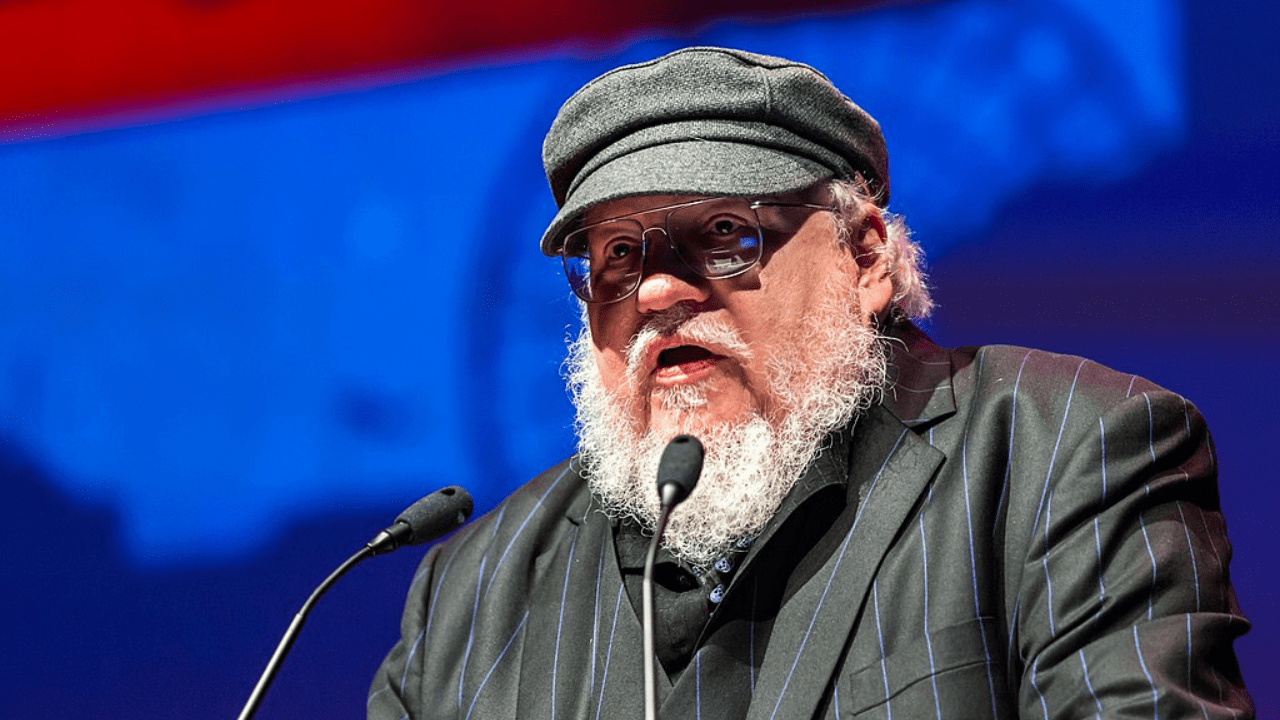
George R. R. Martin speaking with attendees at the 43rd Annual TusCon at the Radisson Hotel Tucson Airport in Tucson, Arizona. Photo Credit: Gage Skidmore from Surprise, AZ, United States of America, CC BY-SA 2.0 , via Wikimedia Commons
Game of Thrones creator George R.R. Martin issued a scathing warning to Hollywood creators and others that if they ignore canon their world or the worlds they are adapting will fall apart.

George R.R. Martin, presenting award the Hugo Award Ceremony 2017, Worldcon in Helsinki. Photo Credit: Sanna Pudas, CC BY 4.0 <https://creativecommons.org/licenses/by/4.0>, via Wikimedia Commons
In a new blog post, Martin discussed the dragons in Game of Thrones and compared and contrasted them to various other dragons such as J.R.R. Tolkien’s Smaug and Verimthrax Pejorative in Dragonslayer as well as Toothless in How To Train Your Dragon among others.
After detailing how adaptations of his series got the the Targaryen heraldry wrong by including dragons with four limbs rather than two, Martin asserted, “Fantasy needs to be grounded. It is not simply a license to do anything you like. Smaug and Toothless may both be dragons, but they should never be confused. Ignore canon, and the world you’ve created comes apart like tissue paper.”

Benedict Cumberbatch as Smaug in The Hobbit: The Desolation of Smaug (2013), Warner Bros. Pictures
These comments come about a month after Martin bashed Hollywood screenwriters and producers for believing they can “improve” on the source material of stand-out authors such as Ian Fleming, Stan Lee, J.R.R. Tolkien, and others when they attempt to adapt their stories to film or television.
He wrote on his blog, “Everywhere you look, there are more screenwriters and producers eager to take great stories and ‘make them their own.’ It does not seem to matter whether the source material was written by Stan Lee, Charles Dickens, Ian Fleming, Roald Dahl, Ursula K. Le Guin, J.R.R. Tolkien, Mark Twain, Raymond Chandler, Jane Austen, or… well, anyone. No matter how major a writer it is, no matter how great the book, there always seems to be someone on hand who thinks he can do better, eager to take the story and ‘improve’ on it.”
He continued, “’The book is the book, the film is the film,’ they will tell you, as if they were saying something profound. Then they make the story their own. They never make it better, though. Nine hundred ninety-nine times out of a thousand, they make it worse.”

Matt Smith as Prince Daemon Targaryen in House of the Dragon (2022), HBO
However, he did note that sometimes they do indeed get it right as he praised FX’s recent Shogun adaptation, “Once in a while, though, we do get a really good adaptation of a really good book, and when that happens , it deserves applause. I can (sp?) came across one of those instances recently, when I binged the new FX version of SHOGUN.”
He later praised, “I think the author would have been pleased. Both old and new screenwriters did honor to the source material, and gave us terrific adaptations, resisting the impulse to ‘make it their own.’”

Dragons in House of the Dragon (2024), HBO
Martin made similar comments back in 2022 alongside novelist Neil Gaiman. The two spoke on the subject during an appearance at the New York City’s Symphony Space.
As reported by Variety, Martin rhetorically asked, “How faithful do you have to be? Some people don’t feel that they have to be faithful at all. There’s this phrase that goes around: ‘I’m going to make it my own.’ I hate that phrase. And I think Neil probably hates that phrase, too.”
Gaiman responded, “I do. I spent 30 years watching people make ‘Sandman’ their own. And some of those people hadn’t even read ‘Sandman’ to make it their own, they’d just flipped through a few comics or something.”

Matt Smith as Prince Daemon Targaryen in House of the Dragon (2022), HBO
Martin then detailed, “There are changes that you have to make — or that you’re called upon to make — that I think are legitimate. And there are other ones that are not legitimate.”
Variety’s Ethan Shanfeld then details Martin recalled Roger Zelazny adapting The Last Defender of Camelot for The Twilight Zone and that “due to budget constraints, being forced to choose between having horses or an elaborate Stonehenge-esque set for a battle scene.” Martin did not want to make the decision so he left it up to Zelazny who chose to cut the horses.
Martin explained, “That, to my mind, is the kind of stuff you are called upon to do in Hollywood that is legitimate.” He even noted this is why the Iron Throne is not depicted in the show as it is written in the books, “Why is the Iron Throne in Game of Thrones not the Iron Throne as described in the books? Why is it not 15 feet high and made of 10,000 swords? Because the ceiling in our soundstage was not 15 feet high! We couldn’t fit in in there, and they weren’t willing to give us St. Paul’s Cathedral or Westminster Abbey to shoot our little show in.”

A dragon in House of the Dragon (2024), HBO
Martin’s most recent comments echo what J.R.R. Tolkien wrote in his On Fairy Stories essay. Tolkien detailed that a story-maker proves himself a successful sub-creator when he “makes a Secondary World which your mind can enter. Inside it, what he relates is ‘true’: it accords with the laws of that world. You therefore believe it, while you are, as it were, inside.”
However, Tolkien adds, “The moment disbelief arises, the spell is broken; the magic, or rather art, has failed. You are then out in the Primary World again, looking at the little abortive Secondary World from outside. If you are obliged, by kindliness or circumstance, to stay, then disbelief must be suspended (or stifled), otherwise listening and looking would become intolerable. But this suspension of disbelief is a substitute for the genuine thing, a subterfuge we use when condescending to games or make-believe, or when trying (more or less willingly) to find what virtue we can in the work of an art that has for us failed.”

Benedict Cumberbatch as Smaug in The Hobbit: The Desolation of Smaug (2013), Warner Bros. Pictures
What do you make of Martin’s comments?





